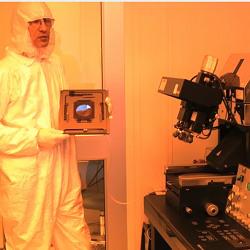Federal and state initiatives are making broad investments in education and workforce training in support of advanced manufacturing and nanotechnology initiatives. Leveraging federal funding opportunities for public-private partnerships, state and regional investments have expanded existing programs to create a more direct impact for industry needs. Federal investments in academic programs and centers have provided educational tools and opportunities for K-12 and undergraduate exposure to science and technology, including notional aspects of nanotechnology.
Under a recently announced initiative, education and workforce development are considered critical to the advancement of nanotechnology and are encompassed within one of the four goals of the National Nanotechnology Initiative (NNI): “Develop and sustain educational resources, a skilled workforce, and a dynamic infrastructure and toolset to advance nanotechnology.” As new knowledge is created through exploratory research and development, it is a challenge to translate this understanding into the educational system and to the broader public. Over the past fifteen years of the NNI, there have been several activities that have made significant contributions in this area: public outreach and informal education by the NSF Nanoscale Informal Science Education Network (NISE Net) through programs such as NanoDays; technician and workforce training through programs such as the NSF Advanced Technological Education Centers including the Nanotechnology Applications and Career Knowledge (NACK) Network; countless university courses and degree programs; and the emerging incorporation of nanoscience into the K-12 science education standards in states such as Virginia. To build upon this strong foundation, several announcements were recently made at the White House Forum on Small Business Challenges to Commercializing Nanotechnology including the establishment of a Nano and Emerging Technologies Student Leaders conference, a webinar series focused on providing information for teachers, and a web portal of nanoscale science and engineering educational resources.
Expanding upon such initiatives is essential to creating a robust eco-system for nanotechnology to evolve into sustainable industry sectors. As highlighted over the years by the NNN, activities essential to this endeavor include aspects such as standards, materials, equipment and processes, and information exchange, but the creation of an educated workforce provides the cornerstone for commercialization of nanotechnology. These education programs must enable an accessible workforce that can readily meet the needs of existing and emerging industries. The NNN applauds and supports the range of initiatives that have already been announced and looks forward to explore new concepts in developing a well-trained, educated workforce to meet the future needs in nanotechnology commercialization.

